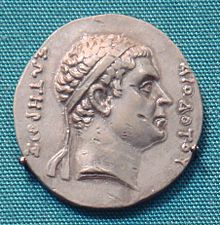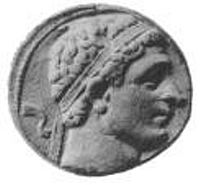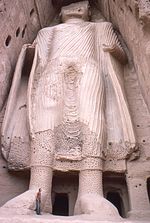- Diodotus I
-
Diodotus I Greco-Bactrian king
"Pedigree" coin of Agathocles, with the effigy of Diodotus, the Greek inscription reads: ΔΙΟΔΟΤΟΥ ΣΩΤΗΡΟΣ - "(of) Diodotus the Saviour".Reign c. 255 BC – c. 239 BC Titles The Saviour Diodotus I Soter (Greek: Διόδοτος Α' ὁ Σωτήρ) (c. 285 BC – c. 239 BC) was Seleucid satrap of Bactria, rebelled against Seleucid rule soon after the death of Antiochus II in c. 255 or 246 BC, and wrested independence for his territory.[1] He died in 239 BC.
This event is recorded by Trogus, Prol. 41; Justin xli. 4, 5, where he is called Theodotus; Strabo xi. 515). The name apparently is related to the title Soter he uses for himself. His power seems to have extended over the neighbouring provinces. Diodotus was a contemporary, a neighbour, and probably an ally of Andragoras, the satrap of Parthia, who at about the same time also proclaimed independence from the Seleucid Empire.
Contents
Independence and prosperity
Diodotus wrested independence for his territory after the death of the Seleucid ruler Antiochus II, who had been embroiled in a war against Ptolemaic Egypt:
- Diodotus, the governor of the thousand cities of Bactria (Latin: "Theodotus, mille urbium Bactrianarum praefectus"), defected and proclaimed himself king; all the other people of the Orient followed his example and seceded from the Macedonians. (Justin, XLI,4 [2])
The new kingdom, highly urbanized and considered as one of the richest of the Orient (opulentissimum illud mille urbium Bactrianum imperium "The extremely prosperous empire of the thousand cities of Bactria" Justin, XLI,1 [3]), was to further grow in power and engage into territorial expansion to the east and the west:
- "The Greeks who caused Bactria to revolt grew so powerful on account of the fertility of the country that they became masters, not only of Ariana, but also of India, as Apollodorus of Artemita says: and more tribes were subdued by them than by Alexander... Their cities were Bactra (also called Zariaspa, through which flows a river bearing the same name and emptying into the Oxus), and Darapsa, and several others. Among these was Eucratidia, which was named after its ruler." (Strabo, XI.XI.I [4])
The newly declared King married a daughter, born c. 266 BC, of Antiochus II Theos and wife Laodice I and had two children: Diodotus II and a daughter, born c. 250 BC, who married Euthydemus I.[citation needed]
Conflict with Arsaces
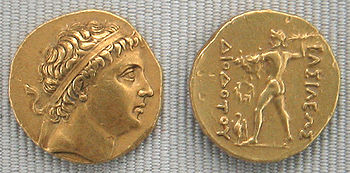 Gold coin of Diodotus c. 250 BC. The Greek inscription reads: ΒΑΣΙΛΕΩΣ ΔΙΟΔΟΤΟΥ - "(of) King Diodotus".
Gold coin of Diodotus c. 250 BC. The Greek inscription reads: ΒΑΣΙΛΕΩΣ ΔΙΟΔΟΤΟΥ - "(of) King Diodotus".
Arsaces, the chieftain of the nomadic (Dahan) tribe of the Parni, fled before him into Parthia and there eliminated Andragoras, the former satrap and self-proclaimed king of Parthia, and became the founder of the Parthian Empire (Strabo l.c.). The Greco-Bactrians became cut from direct contacts with the Greek world. Overland trade continued at a reduced rate, while sea trade between Greek Egypt and Bactria developed. When Seleucus II in 239 BC attempted to subjugate the rebels in the east, it appears he and Diodotus united together against the Parthians (Justin xli. 4, 9).
Soon afterwards Diodotus died and was succeeded by his son Diodotus II, who concluded a peace with the Parthians (Justin l.c.). Diodotus was succeeded by his son Diodotus II, who allied himself with the Parthian Arsaces in his fight against Seleucus II:
- "Soon after, relieved by the death of Theodotus [Justin uses a erroneous version of the name], Arsaces made peace and concluded an alliance with his son, also by the name of Theodotus; some time later he fought against Seleucus who came to punish the rebels, and he prevailed: the Parthians celebrated this day as the one that marked the beginning of their freedom" (Justin, XLI,4 [5])
Diodotus II was subsequently killed by a usurper, Euthydemus, founder of the Greco-Bactrian Euthydemid dynasty (Polyb. xi. 34, 2).
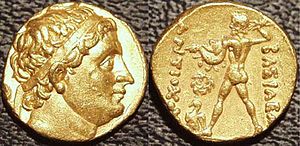 Gold stater of Diodotus in the name of the Seleucid emperor Antiochus I Soter, c. 250 BCE. Diodotus effectively declared his independence from Seleucid control by placing his own portrait on the obverse of the coin, and replacing Antiochos's preferred deity Apollo with the Zeus shown on this coin.
Gold stater of Diodotus in the name of the Seleucid emperor Antiochus I Soter, c. 250 BCE. Diodotus effectively declared his independence from Seleucid control by placing his own portrait on the obverse of the coin, and replacing Antiochos's preferred deity Apollo with the Zeus shown on this coin.
Coinage
Of Diodotus I we possess gold, silver and bronze coins, some of which are struck in the name of Antiochos. As the power of the Seleucids was weak and continually attacked by Ptolemy II, the eastern provinces and their Greek cities were exposed to the invasion of the nomadic barbarians and threatened with destruction (Polyb. xi. 34, 5); thus the erection of an independent kingdom may have been a necessity and indeed an advantage to the Greeks, and this epithet well deserved. Diodotus Soter appears also on coins struck in his memory by the later Graeco-Bactrian kings Agathocles and Antimachus. Cf. AV Sallet, Die Nachfolger Alexanders d. Gr. in Baktrien und Indien; Percy Gardner, Catal. of the Coins of the Greek and Scythian Kings of Bactria and India (Brit. Mus.).
External links
Preceded by:
Antiochus II
(Seleucid Empire)Greco-Bactrian Ruler Succeeded by:
Diodotus II This article incorporates text from a publication now in the public domain: Chisholm, Hugh, ed (1911). Encyclopædia Britannica (11th ed.). Cambridge University Press.
This article incorporates text from a publication now in the public domain: Chisholm, Hugh, ed (1911). Encyclopædia Britannica (11th ed.). Cambridge University Press.References
History of Afghanistan Timeline Bronze age and Proto-Elamite culture in Nimruz area (2300–1800 BC) Bronze age and Indus valley civilization in Mundigak (Kandahar area) (2200–1800 BC) Bronze age and Oxus civilization in northern Afghanistan (2100–1800 BC) Late Bronze age and Iron age and coming of Aryans (1700–700 BC) Median Empire (728–550 BC) Achaemenids (550–330 BC) Seleucids (330–150 BC) Mauryans (305–180 BC) Greco-Bactrians (256–125 BC) Indo-Greeks (180–130 BC) Indo-Scythians (Sakas) (155–80? BC) Indo-Parthians (20 BC–50? AD) Kushans (135 BC–248 AD) Sassanids (230–565) Indo-Sassanids (248–410) Kidarites (320–465) Hephthalites (410–557) Kabul Shahi (565–879) Rashidun Caliphate (642–641) Umayyads (661–750) Abbasids (750–821) Tahirids (821–873) Saffarids (863–900)) Samanids (875–999) Ghaznavids (963–1187) Seljukids (1037–1194) Khwarezmids (1077–1231) Ghorids (1149–1212) Ilkhanate (1258–1353) Kartids (1245–1381) Timurids (1370–1506) Arghun (1479-1522) Mughals (1501–1738) Safavids (1510–1709) Hotaki dynasty (1709–1738) Afsharids (1738–1747) Durrani Empire (1747–1826) Emirate of Afghanistan (1826–1919) Kingdom of Afghanistan (1919–1973) Republic of Afghanistan (1973–1978) Democratic Republic (1978–1992) Islamic State (1992–1996) Islamic Emirate (1996–2001) Islamic Republic (2001–) Afghan Civil War 1979–1989 1989–1992 1992–1996 1996–2001 2001–present
- ^ "The Greek kingdoms of Central Asia," p. 100. P. Bernard in: History of civilizations of Central Asia, Volume II. The development of sedentary and nomadic civilizations: 700 B.C. to A.D. 250. Harmatta, János, ed., 1994. Paris: UNESCO Publishing. ISBN 92-3-102846-4
- ^ Justin XLI, paragraph 4
- ^ Justin XLI, paragraph 1
- ^ Strabo XI.XI.I
- ^ Justin XLI.4)
Categories:- 239 BC deaths
- Greco-Bactrian kings
- 3rd-century BC rulers
- Seleucid satraps
Wikimedia Foundation. 2010.

